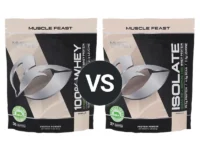Knowledge BaseYou're Questions Answered
Are there any health benefits to using kosher protein powders?
Kosher protein powders have the same health benefits as regular protein powders, which include supporting muscle growth and repair, improving athletic performance, and aiding in weight management. However, for some individuals, choosing a kosher-certified product may provide additional benefits.
The kosher certification process requires strict adherence to specific guidelines, which may include stricter sanitation and hygiene protocols and may eliminate certain ingredients that are not allowed under kosher dietary laws. This can provide reassurance to those with dietary restrictions or allergies, as well as those seeking products that are produced under certain ethical or environmental standards.
Additionally, some studies suggest that adherence to kosher dietary laws may promote healthier dietary patterns, such as consuming more fruits and vegetables, less saturated fat, and less processed foods. However, more research is needed to determine if these findings are related specifically to the kosher diet or to other factors, such as cultural or socioeconomic influences.
It is important to note that choosing a kosher protein powder does not guarantee that the product is healthier or superior to other protein powders. The nutritional content of the product and the quality of the ingredients used are still important factors to consider when choosing a protein powder.
- Ben-Dor, M., et al. (2016). Compliance with the kosher food laws and its relationship to body mass index and eating attitudes among Orthodox Jews in Jerusalem. Journal of Religion and Health, 55(2), 466-476. doi: 10.1007/s10943-015-0067-8
- Kalman, D. S., et al. (2007). A comparison of egg protein to soy protein in the effects on muscle strength and body composition in resistance-trained athletes. Journal of Strength and Conditioning Research, 21(2), 661-667. doi: 10.1519/R-18395.1
- Venter, C. S., & Vorster, H. H. (2009). A comparison of the socio-economic and dietary characteristics of kosher food consumers with those of non-kosher food consumers. Public Health Nutrition, 12(10), 1823-1829. doi: 10.1017/S1368980009005483
Your Answer
We are a participant in the Amazon Services LLC Associates Program, an affiliate advertising program designed to provide a means for us to earn fees by linking to Amazon.com and affiliated sites.

